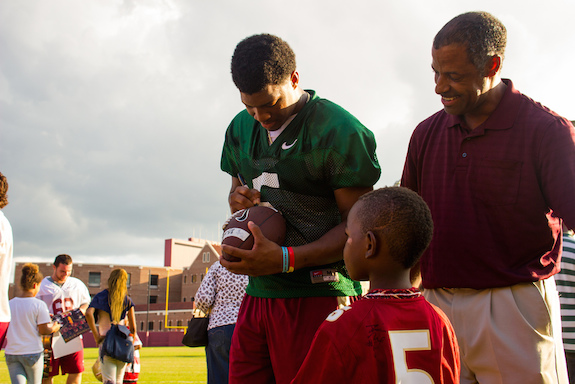
The New York Times reports officials improperly investigated rape allegations against FSU’s quarterback Jameis Winston and now another case involving an FSU football player. (Photo via Second Judicial Circuit Guardian ad Litem Program)
By Ashley Lopez
Florida Center for Investigative Reporting
Tallahassee law enforcement made national news again for failing to properly investigate criminal cases involving Florida State University football players.
Earlier this year The New York Times chronicled how police in Tallahassee bungled the investigation of an alleged rape case involving FSU’s star player Jameis Winston.
Now, the Times has again covered a similar situation.
According to the newspaper, Tallahassee police did not properly investigate a domestic violence case involving an FSU football player.
The Times writes that last January witnesses called 911 warning that “a man was beating a woman holding a baby outside their apartment as she tried to leave.” However, little was done to address the matter.
Officers responding to a domestic violence call have a legal duty to investigate thoroughly, seek written statements from witnesses and from the victim, instruct the victim on how to seek help and, finally, forward their report to the local domestic abuse crisis center. But, according to their brief report on the episode, the officers did none of that.
They did, however, find the case significant enough to notify their sergeant — “due to the fact that it was an F.S.U. football player,” the report said. The sergeant, a Florida State University sports fan, signed off on it and the complaint was filed away as “unfounded.”
This incident follows a flood of national attention surrounding Winston’s controversial case.
In December 2012, a freshman at FSU accused Winston of sexual assaulting her off-campus after meeting at a popular abar called Potbelly’s. Records show there was evidence the young woman had been assaulted, but prosecutors were unable to charge Winston.
According to the Times, the university did little to nothing in an effort to determine what had happened that night back in 2012. Furthermore, the Times reports that the local police officer in charge of handling the case, Scott Angulo, had connections to the football franchise and did not look into some of the many leads in the case—including details from the accuser’s testimony where she said she met three men at the bar that night, one of them was a football player named Chris and that all four took a taxi home that night.
Police also failed to acquire tape from the bar’s 30 surveillance cameras. Angulo didn’t ask the school’s athletic department to help him find Chris—who it turns out had a video of what happened that night, but erased it by the time the cops learned about it. And neither Angulo nor the prosecutor’s office subpoenaed the phone records of the three men who were with the accuser and Winston that night — even though they investigated all electronic communications to and from the accuser around the time of the alleged sexual assault.
In short, basic police work was bungled and the allegations against Winston did not move forward.
According to a story published by the Times this week, this has become a reoccurring problem.
An examination by The New York Times of police and court records, along with interviews with crime witnesses, has found that, far from an aberration, the treatment of the Winston complaint was in keeping with the way the police on numerous occasions have soft-pedaled allegations of wrongdoing by Seminoles football players. From criminal mischief and motor-vehicle theft to domestic violence, arrests have been avoided, investigations have stalled and players have escaped serious consequences.
In a community whose self-image and economic well-being are so tightly bound to the fortunes of the nation’s top-ranked college football team, law enforcement officers are finely attuned to a suspect’s football connections. Those ties are cited repeatedly in police reports examined by The Times. What’s more, dozens of officers work second jobs directing traffic and providing security at home football games, and many express their devotion to the Seminoles on social media.
Certainly, Florida State football players have not always sidestepped prosecution. Over the last three years, at least nine players have been arrested on charges ranging from sexual assault to being an accessory to a fatal shooting.
But on other occasions, despite strong evidence, investigations have been delayed and sometimes derailed.
This story and the Times’ look into the Jameis Winston case were written by Pulitzer Prize-winning investigative reporter Walt Bogdanich.
